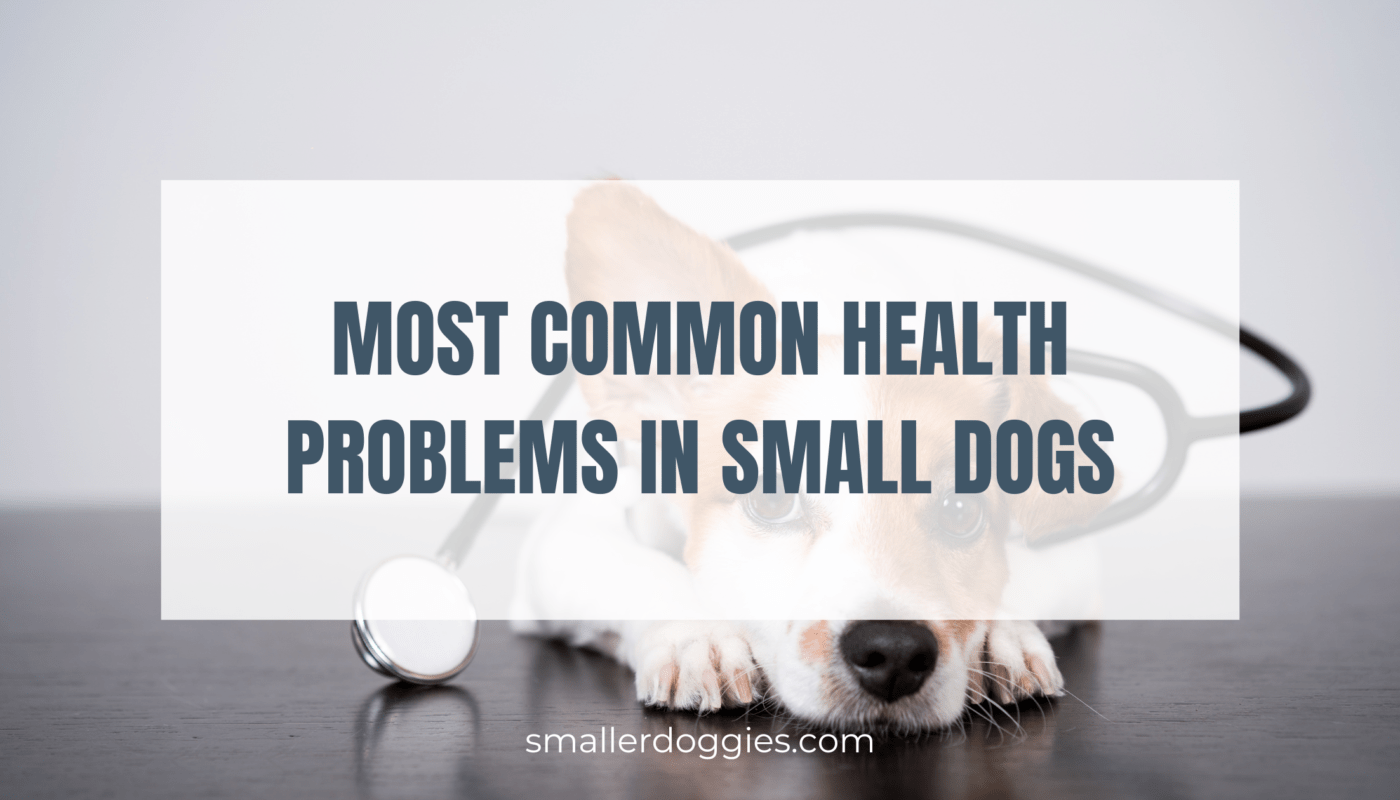Post Disclaimer
This post may contain affiliate links. If you use these links to buy something we earn a commission at no extra cost to you. Smaller Doggies is supported by its audience, Thank you!
If you’re as crazy about these pint-sized pups as I am, then you know that while they may be tiny in stature, they’re huge in personality. But let’s face it, being a small dog owner comes with its own set of worries, especially when it comes to their health. In this blog post, we’re going to dive deep into the most common health problems in small dogs, shedding light on issues that can affect our beloved companions. So, grab a cup of coffee, snuggle up with your furry friend, and let’s touch on the most common health problems in small dogs.

9 Common Health Problems in Small Dogs
1. Tiny Teeth Problems:
Small dogs may have adorable smiles, but they often suffer from dental diseases. The cramped conditions in their mouths lead to tartar buildup, periodontal disease, and gum disease. Regular teeth brushing and check-ups are vital to prevent tooth decay and bad breath. Additionally, providing dental treats and toys can help keep their teeth clean and healthy.
2. Orthopedic Issues:
Petite pooches are prone to orthopedic conditions such as patellar luxation and Legg-Calve-Perthes disease. These can cause dislocation of the kneecaps and hindlimb lameness, respectively. Maintaining your companion’s weight and encouraging regular, low-impact exercise can help prevent these joint issues. Consider providing ramps or stairs to help them access higher surfaces without straining their joints.
3. Respiratory Complications:
Small breeds, especially those with flat faces like pugs and bulldogs, often face challenges with breathing due to brachycephalic airway syndrome. It’s essential to avoid strenuous activities in hot conditions to prevent exacerbating respiratory difficulties. Providing a cool and well-ventilated environment can also help ease breathing for these breeds.
4. Cardiac Concerns:
Small canines are susceptible to heart problems such as mitral valve disease and congestive heart failure. Regular heart screenings are crucial to catching signs like exercise intolerance, difficulty breathing, and fainting early on. Additionally, incorporating heart-healthy supplements like omega-3 fatty acids into their diet can support cardiovascular health.
5. Skin and Coat Challenges:
Allergies are common in small dogs and can leave their skin itchy and irritated. Monitoring their diet and environment is essential to mitigating allergic reactions and maintaining healthy skin. Consider switching to hypoallergenic grooming products and ensuring your pet’s bedding is cleaned regularly to reduce allergen exposure.
6. Obesity and Its Ripple Effects:
A sedentary lifestyle and improper diet can lead to obesity in small dogs, increasing the risk of diabetes, arthritis, and heart disease. It’s crucial to monitor meal portions and choose high-quality, low-calorie foods tailored to their nutritional needs. Incorporating interactive toys and activities into their daily routine can also help them stay active and maintain a healthy weight.
7. Eye Conditions:
Regular eye exams are important for small breeds to detect issues such as cataracts early on and preserve their vision. Ensuring they receive adequate eye care, including regular cleaning and inspection, can help prevent common eye problems. Additionally, protecting their eyes from injury by avoiding rough play and providing UV-blocking sunglasses can further safeguard their eye health.
8. Neurological Complications:
Conditions like intervertebral disk disease (IVDD) can pose serious neurological complications for small breeds, potentially leading to paralysis. Quick medical intervention is essential in these cases to prevent further damage. Providing supportive care, including restricted activity and pain management, can aid in their recovery and improve their quality of life.
9. Weight Management Essentials:
Being mindful of your dog’s dietary needs is crucial to avoiding weight gain and associated health issues. Consult with your veterinarian to determine the appropriate portion sizes and feeding schedule for your pet’s size and activity level. Incorporating regular exercise into their routine, such as daily walks or play sessions, can help them maintain a healthy weight and overall well-being.
Preventive Care and Monitoring
Preventing common health problems in small dogs involves being proactive and vigilant. Regular vet check-ups, a healthy and balanced diet, and consistent exercise are your best allies. Watch for changes in behavior or physical condition, and seek prompt veterinary attention when needed.
In conclusion, while small dog breeds offer a world of companionship and charm, they also demand diligent care and attention to their unique health needs. By understanding and addressing these common health concerns, you can provide your petite pooch with the best possible quality of life. Your small dog is not just a pet, but a cherished member of your family. Keep them happy, healthy, and thriving with responsible ownership and attentive healthcare.







